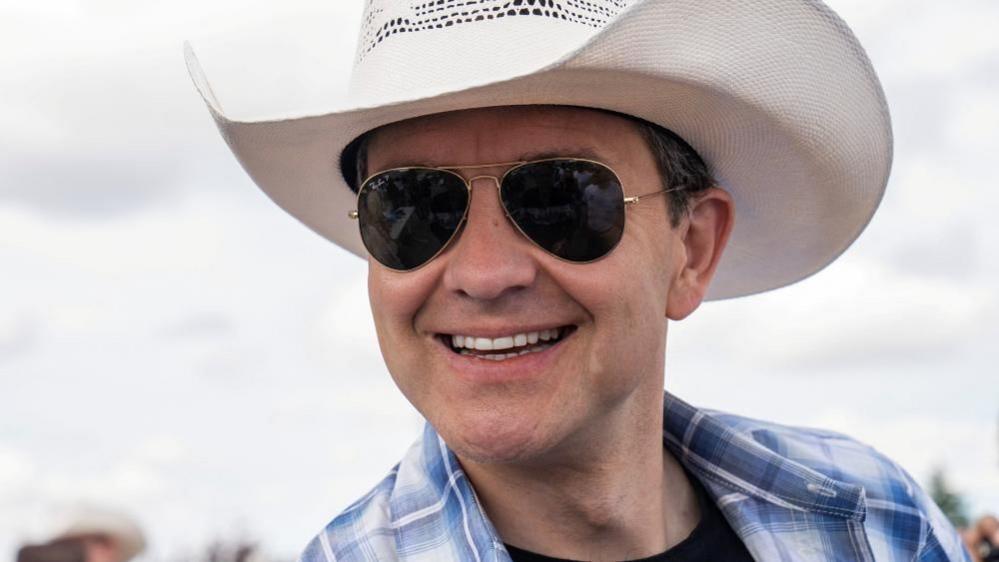Canada's conservative leader faces crucial election test

- Published
Pierre Poilievre is facing a crucial by-election test as leader of Canada's Conservative party after losing his constituency in the last general election.
Poilievre is widely expected to win the race for the rural Alberta riding and regain a seat in the House of Commons, despite facing a record 214 candidates, many associated with a protest group seeking electoral reform.
It is the second time the group has targeted Poilievre in a campaign, and voters in the riding will need to fill out a write-in ballot due to the unusually high number of names.
Poilievre, facing a mandatory leadership review in January, will have to show he can win the Conservative stronghold by a significant margin.
The Conservative party leader has been out of the House since April, when his party was defeated by Mark Carney's Liberals and he lost the Ottawa-area riding he had held since 2004 to Liberal Bruce Fanjoy.
Losing his seat has left him sidelined and focused on winning the Battle River-Crowfoot riding as Carney, who is new as prime minister, enjoys a honeymoon with the Canadian public.
Opinion polls suggest that the Liberals have around 40% support with the Conservatives trailing slightly behind.
In June, former member of Parliament (MP) Damien Kurek resigned to allow Poilievre to run in the sprawling, largely agricultural constituency almost the size of Nova Scotia.
Kurek won the riding with more than 80% of the vote.
The political move faced some pushback in the region, including by independent candidate Bonnie Critchley, a retired army veteran who said it motivated her to mount a challenge against Poilievre.
She has accused him of seeking to win the riding as "nothing more than a means to an end".
Political analyst and former Conservative Alberta MP Joan Crockatt told the BBC that "at the beginning there was some question among people's minds of whether [Poilievre] was a parachute candidate".
But she believes many in the riding have come to view Calgary-born Poilievre as "a guy who does want to represent them, has core values that match their core values".
The campaign has also brought attention to a region of the country with a significant energy sector that has long felt overlooked by politicians in Ottawa - and comes amid an emergent separatist sentiment in the western province.
"You may see some votes on the right of where Pierre is, because he wants to keep Canada together," Ms Crockatt said.
"He's loyal to Canada. And there are sentiments of separation here that do run pretty deep. People are starting to lose their patience."
This is also the second race where Poilievre has faced the Longest Ballot Committee. The group advocates for a review of Canada's first-past-the-post electoral system, which it says doesn't adequately represent the vote. It has targeted a number of high-profile races in recent years with campaigns to flood ballots with candidates in protest.
He has decried the group as a "scam" and has proposed rules changes to curb the protests. Critchley and other independent candidates have also criticised the group.
In order to avoid an unwieldy ballot, the elections agency managing the vote announced in July that it would implement a write-in ballot to replace one that typically lists candidates by name. A full list of candidates will be available at polling stations.
Almost 14,500 people have already cast ballots in advanced voting.
Even if Poilievre wins, his margin of victory will be closely scrutinised. Conservative candidates in the riding have in the past received at least 70% of the vote.
While Poilievre had the personal blow of losing his seat in April's election - and blowing a more than 20-point lead over the Liberals - the party saw a significant rise in their share of the national vote compared to the last national vote four years ago.
Due to the election loss, Poilievre faces a mandatory leadership review in the new year.
"He'll have to perform when he gets back in the House," Ms Crockatt said. "I think there's very little doubt that he will, but the eyes will all be on him."
Poilievre has been auditioning lines of attack against Carney and the Liberals, who he accuses of not doing enough to support Canadians hit by trade wars with the US and China, which recently imposed a 76% tariff on Canadian canola - a penalty that is affecting his potential future constituents.
"Mark Carney promised he was an international man of mystery who is going to negotiate deals and end tariffs," Poilievre said last Friday.
"Well, what's the result been so far?"